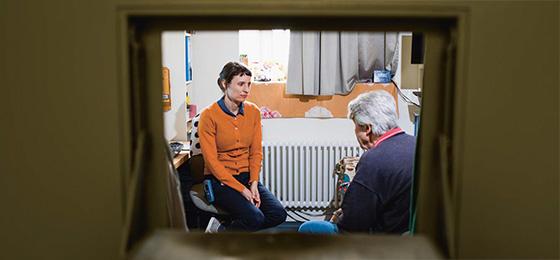A woman researcher in a men's prison

Some 150 inmates are currently committed in Swiss correctional facilities. The ethnologist Irene Marti, a doctoral student at the University of Neuchâtel, has been looking into how they cope. She participated in their everyday routine and played ping pong with them.
(From "Horizons" no. 110 September 2016)
Prison is a very practical place to do research. The people are there, they've got time and want to talk. Prisons are characterised by a kind of artificial normality: people are polite to each other, their daily routine is prescribed, and things usually run smoothly. A woman researcher is a welcome distraction. I've visited the correctional facilities of Lenzburg and Pöschwies for four weeks each. I wanted to find out how being in custody affects the prisoners, and how they deal with their life situation. I make no judgements about their being in prison; I just want to make their experiences visible.
"At the beginning I had to build trust. That's why I spent the weekdays with the prisoners. I arrived at 7 a.m. and went along to work in the painting group or the print workshop. In the evening I played ping pong or badminton with the prisoners, and they taught me how to play the card game 'Jass'. The fact that I'm a woman certainly also played a role. One prisoner told me it really did him good to be able to talk with a woman again.
Man and murderer
"As a woman in a men's prison, my femininity was really on my mind during this time. I paid exact attention to what I wore every morning. Especially during sports, I made sure that my clothing wasn't too tight. But I also didn't want to pretend to be what I'm not, and wanted to feel comfortable in my role as a woman researcher. I was never afraid. There are cameras in lots of places, there were usually prison wardens nearby, and when I was alone in a room with a prisoner, I had an alarm device with me. With some prisoners, the warden advised me that I had to be careful.
"I didn't read anyone's files in advance, as I wanted to meet the prisoners without prejudice. That changed after a week, and I read everything. The younger prisoners in particular come across as sympathetic and friendly. But behind their pleasant appearance, they've committed a crime, sometimes a brutal crime. It was difficult for me to comprehend that. I soon realised that I had to separate the crime from the person seated opposite me. That helps you to engage with them meaningfully. A murderer isn't just a murderer, but also a human being. I didn't talk with them about guilt. But their crime was still there in the background the whole time. That's why they were in prison, whereas I was able to go home in the evening.
"During my visits, I tried to have 'normal' relationships with the prisoners. I think I succeeded. Otherwise, I would have been unable to pose such personal questions in my extensive interviews. They were open with me in return, as much as was possible in that particular context. Altogether, I interviewed 18 prisoners.
Precious freedom
"Those men who had only recently been sent to prison weren't yet able to grasp their situation – the fact that things might stay the same until the end of their lives. Some of them fight against it. For them, this fight is a kind of motor – it's their way of holding on to life. Others have given up on themselves and only want to watch TV and eat. It seems to me that they're broken by their lack of prospects. But there are also some of whom you couldn't imagine that they've been imprisoned for many years. They are full of strength and are motivated. They do further education courses or learn foreign languages. They have worked on themselves, they've changed. They want to show the world outside what people they have become. One of them said to me, he didn't think about the future because he had none. The future was outside, and he wouldn't be going outside any more. In fact, only very few of them are ever released from custody.
"On the evenings, I went back to my rented room and typed up my notes. I was full of impressions, because I pretty much immersed myself in their world. Some of their life stories were tough, and it weighed on me. At that time, I often dreamed of keys. That's a powerful symbol of prison. I emerged again at weekends when I was together with friends and family. I enjoyed being able to organise my days myself. I walked over a meadow and the sun was shining. Then I could really feel how precious freedom is.
Recorded by Anne-Careen Stoltze / Image: Andreas Moser